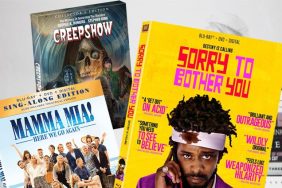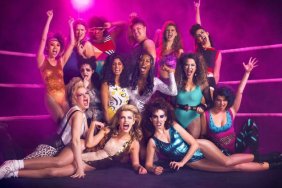Marc Guggenheim got his start in television, writing for popular series like The Practice and Law & Order. Then he ventured into the wild world of comics, writing memorable runs of The Flash and Blade. And then, in a move that has made him one of the most influential producers in popular culture, he brought the comics back with him to television, producing the hit CW series Arrow with fellow show runners Greg Berlanti and Andrew Kreisberg. His dramatic new take on the comic book hero Green Arrow redefined the character for a new generation, leading to an even flashier spin-off, The Flash, and the upcoming team-up series DC’s Legends of Tomorrow, which will combine the supporting cast members of both series and introduce more new heroes into this ever widening television franchise.
With Season 3 of Arrow concluding tonight, and with the new announcement of his upcoming Legendary comic book The Infinite Adventures of Jonas Quantum (with art by Freddie Williams II), we thought it would be a good time to get Marc Guggenheim on the phone. Join us as we pick the writer/producer’s brain about his latest comic – about “a maverick hyper-genius with the power to cure death in the morning, time travel in the afternoon and unlock transdimensional wormholes at night” – and the creative decisions behind the most recent season of Arrow.
Guggenheim tells us that Season 4 of Arrow will be lighter in tone than Season 3, and that it will – along with Season 2 of The Flash – begin telling the story that will continue in DC’s Legends of Tomorrow. Find out more below!

Marc Guggenheim: Perhaps it’s a little bit of a misnomer. Right now we’ve got six issues planned but I think the hope is that if the fans respond to it and the retailers respond to it, we’ll do more.
So you would like to continue Jonas Quantum infinitely?
Yeah, I would very much like to continue it. I feel like the idea was really to introduce a brand new character and sort of set him loose. Each of the six issues actually are all going to be self-contained, with not a high degree of serialization between them. It’s really designed to go beyond six, so hopefully we’ll get a chance to that.
The idea behind Jonas Quantum is that he is a super-genius…
I like to say that his intellect is his super power.
How do you write someone who by definition must be smarter than you?
You know, that’s a good question. I’m tempted to quote David Mamet, in his movie… what was it?
Heist?
Heist, thank you. “I try to picture a guy smarter than me and ask, ‘What would he do?’” It’s definitely hard. That’s a challenge. But it’s a fun challenge, and I think a lot of it lies in just unleashing my creativity, and unleashing my imagination. Because the show – sorry, it’s not a show, I’m so used to saying “show” – the series is not just about a guy going for his doctoral dissertation, it’s about this guy who invents all these amazing things and goes to all these amazing times and places and dimensions. It’s really a book about ideas, so I’m just trying to push myself in terms of what manner of craziness I can come up with.
You’ve got a really great artist on this. Are you trying to push him as well? Are you going out of your way to make Freddie Williams II draw something insane?
You know it’s funny you should ask. I worked with Freddie before on Justice Society of America. I love Freddie but I oftentimes find myself writing in the scripts “I’m really sorry” or “You must hate me now.” But at the same time he’s such a gamer. I haven’t managed to write anything yet where he said, “Are you out of your mind?!” even though he really should have a few times. I think there are a lot of artists who would have said “Are you out of your mind?” but he just keeps saying, “Bring it.”
Is there a particular issue or story of Jonas Quantum that you are especially proud of, and that you want us to look out for, since they’re all self-contained?
I’ll tell you, I think the second issue is really interesting. I think the second issue has a nice mix of crazy ideas but also some surprises, and it has a twist to it that I think is the right kind of surprising in the world of comics. It’s like, “Oh, wait a minute, why hasn’t anyone done this before?” That’s a lot of fun for me.

I haven’t seen the season finale of Arrow yet, obviously, but now that it’s coming to an end, can you tell me what the original plan was for this season, and how that plan may or may not have changed over time?
We always work out a few seasons in advance. I think for us the season ended pretty much exactly the way we had planned. The surprise or two along the way – and there always are surprises along the way – is it wasn’t until we were working out the mid-season finale, where we knew in the mid-season finale that Oliver would face Ra’s [al Ghul], but we didn’t know specifically what the outcome was going to be.
I remember we had one specific meeting, Greg [Berlanti], Andrew [Kreisberg] and I, where we were talking about the mid-season finale and it sort of evolved into, well, if we have Ra’s defeat Oliver and leave him for dead, and then bring Oliver back at some point, and Ra’s is so impressed by the fact he survived that Ra’s chooses Oliver as his successor. That actually gave the story that we had already worked out a couple nice surprise turns to it, and really helped drive us to where we knew we wanted to go.
But those particular plot twists were not something we had worked out in advance. We knew where we were beginning, we knew where we were ending. We thought we had a pretty good idea as to how we were going to get there, but we always give ourselves permission to change the game a bit, and we did that here.
Various characters pronounce Ra’s al Ghul’s name differently. Is there a rhyme or reason to that?
No, no, there actually is. [Laughs.] In fact I write in the scripts some pronunciation guides to make sure the right people are saying it the right way. Just a little bit of background: there’s some conflicting ways of pronouncing it. I think the dyed in the wool fans, and the fans of the Justice League cartoon pronounce it “Raysh,” and people more familiar with the Chris Nolan films pronounce it “Rahz.”
We wanted both sides of fandom to be equally represented, so our rule is, if you are a member of the League of Assassins, if you come from that world, you pronounce it “Raysh.” If you’re from Starling City, or outside that world, you pronounce it “Rahz.”

Ray Palmer has turned to be a really interesting character on the show, and I love what Brandon Routh has done with him, but why did you specifically decide to use The Atom if he was never going to shrink? Did you ever think about making him Ted Kord [The Blue Beetle] or someone else instead?
Well, our original plan was to make him Ted Kord. But DC had other plans for him, and when they heard our idea for the character… because we always start with the idea for the character as a concept, not which comic book character we’re going to use. So we knew we wanted this smart erudite guy who sort of vibrated at Felicity’s frequency. Originally it was going to be Ted Kord. DC said, “No, we’ve got other plans for Ted. What about Ray Palmer?” And we’re like, “Oh, that works well.”
As far as the whole shrinking is concerned, this show is very much a show about origins. It’s a show about characters evolving. There’s a reason Arrow is “Arrow” and not “Green Arrow.” So just because Ray hasn’t shrunk yet doesn’t mean he never will.
On this season you’ve basically removed any characters from whom the protagonists have to keep their secret identity. Does that free you up or does that create more challenges?
It frees us up. One thing we always say is, you know, obviously Oliver has a secret identity, and if we got more story mileage out of Oliver keeping his secret identity then it probably would have been a much better kept secret. We’ve certainly made jokes about it on the show, on camera. Oliver has acknowledged that far too many people know his secret identity. But for us it’s always a function of, what gives us more story? I think the main thing is that we’ve found we get a lot more story out of various people knowing Oliver’s identity, rather than keeping it a secret.
That said, I think Episode 3.18, where Lance found out that Oliver was The Arrow until Roy put that genie back in the bottle in 3.19, is just an example of [getting] more story out of exposing the identity rather than the schmuck bait of trying to conceal it.

One of my favorite storylines in Green Arrow involved Oliver becoming the mayor of Star City. Given the level of social responsibility that’s permeating throughout the entire series, is that something you’re ever thinking about getting to, or is he too young for that?
You know, we certainly talk about it in the writer’s room. We’re all very aware of that storyline. It does come up. I think the answer to that question, apart from the natural creative thing, is how long is the show going to run for? I don’t think that storyline would work for Season 4 or even necessarily Season 5, but depending upon how long the show gets to run, we could definitely find ourselves in that world.
We talked a bit about Season 3 of Arrow. I know you have to be vague, but what sort of story or themes do you want to tackle in Season 4?
We actually have a lot worked out for Season 4 already. We know what the theme of the year is going to be. I’m not quite sure I want to talk about it just yet. Season 3 hasn’t even ended yet. But I will say that we’re striving for a lighter tone in Season 4 than we have in Season 3. Season 3 started off with Sara’s death and as a result that carried through for the entire season, and I think there’s a big desire on our part to lighten things up a little bit.

You’ve got a whole wealth of characters in DC’s Legends of Tomorrow. I know it’s too early to talk in too much detail about it, but this is the third series we have in this TV continuity… is that enough for you guys? Or would you like to expand it more in the future?
Oh gosh. I think right now there’s all this discussion of human cloning, which is probably the only way we’re going to be able to do three shows. Honestly I don’t know. For us, we don’t have any designs on a magic number of shows, each one becomes one at a time. There’s not a long term game plan of, like, “Okay, we’re going to do [this] show this year and that show next year.” It’s really one step at a time, and we’ll just sort of see how things go. We still have so many more miles to go before we sleep on Legends. I can’t [speak] for Greg or Andrew but it’s impossible for me to think about another show beyond the three.
Well, there go my Felicity-led Birds of Prey dreams…
That would be very, very cool. That would be very, very cool, but for now, three shows is what you’ve got!

You surprised everyone when you said that Caity Lotz would be back. Then you said that Rip Hunter is going to be on the show, and I think everyone is assuming that time travel is going to be involved in her return. Is there going to be more of a mystery to it than that, or is it going to be pretty direct once the show begins?
I think what you’ll discover is there’s a fair amount of the story that’s going to be told in both Flash and Arrow prior to the premiere of Legends. Not all your questions may get answered in Legends. It may get answered in one of the two shows.
With Rip Hunter on the show, how much time travel can we honestly expect? Can they go to medieval times or into the 29th Century, or do you want to keep it grounded for budget purposes?
I actually want to keep that a secret for the time being. [Laughs.] For self-preservation purposes.
William Bibbiani is the editor of CraveOnline’s Film Channel and the host of The B-Movies Podcast. Follow him on Twitter at @WilliamBibbiani.






